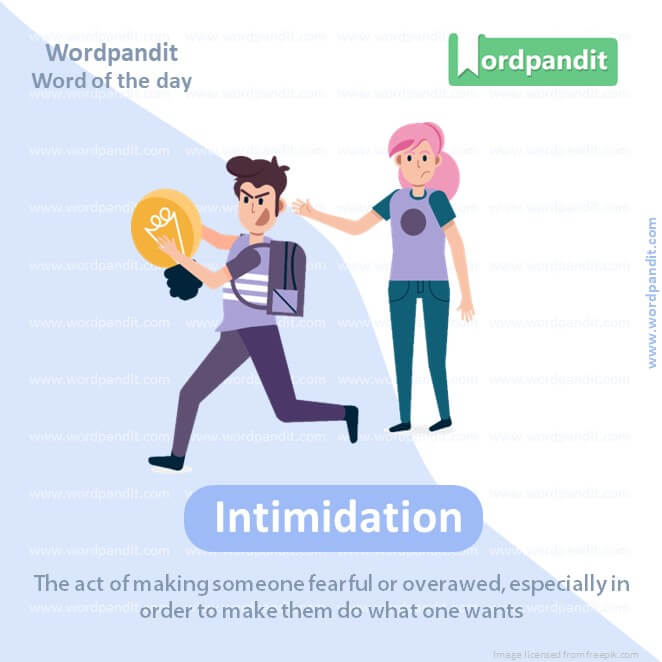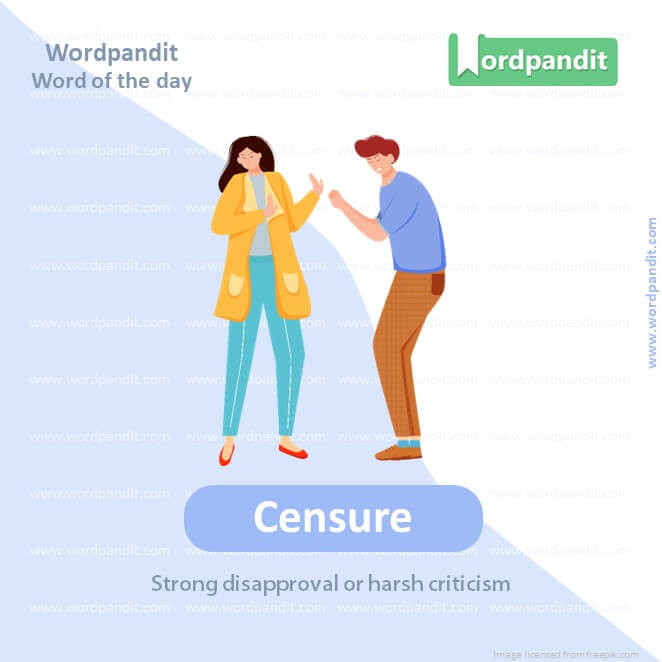Daily Vocabulary Words: List of Daily Used Words in Leading International Newspapers
Hi there. Welcome to this special section @ Wordpandit.
Our endeavour here is very simple: to highlight important daily vocabulary words, which you would come across in leading newspapers in the country. We have included the following newspapers in our selection:
• The New York Times
• The Washington Post
• Scientific American
• BBC
• The Guardian
• Psychology Today
• Wall Street Journal
• The Economist
We are putting in extensive work for developing your vocabulary. All you have got to do is be regular with this section and check out this post on a daily basis. This is your repository of words that are commonly used and essentially, we are posting a list of daily used words. Hence, this has significant practical application as it teaches you words that are used commonly in leading publications mentioned above.
Visit the website daily to learn words from leading international newspapers.

WORD-1: INTIMIDATION
CONTEXT: Citizens in both Ukraine and Bulgaria have taken to the streets in protest, decrying the intimidation tactics used by the government in its recent crackdown on free speech and civil liberties.
SOURCE: The Washington Post
EXPLANATORY PARAGRAPH: Intimidation is when you try to scare someone into doing what you want. It’s like when you make a mean face or say mean things to make your little brother give you his candy.
MEANING: The act of making someone fearful or overawed, especially in order to make them do what one wants (Noun).
PRONUNCIATION: in-tuh-muh-DAY-shun
SYNONYMS: Bullying, Threatening, Frightening, Menacing, Terrorizing, Overawing, Coercion
USAGE EXAMPLE:
1. The bigger boy’s INTIMIDATION made the little one give up the toy.
2. He used INTIMIDATION to control his classmates.
3. The school has a policy against bullying and INTIMIDATION.
4. INTIMIDATION tactics are not accepted in a civilized society.
WORD-2: HARBINGER
CONTEXT: Bird watchers in South America were initially perplexed when they noticed a species of bird unfamiliar to them. However, they soon realized they had stumbled upon what can only be seen as a harbinger of climate change, due to the fact this particular bird species was indigenous to North America.
SOURCE: The Guardian
EXPLANATORY PARAGRAPH: A harbinger is like a messenger that tells you something is coming. Like when you see clouds, you know rain might be coming, the clouds are a harbinger of the rain.
MEANING: Something that shows that something else is going to happen soon, often something bad (Noun).
PRONUNCIATION: HAR-bin-jer
SYNONYMS: Forerunner, Precursor, Herald, Sign, Indicator, Signal, Predictor
USAGE EXAMPLE:
1. The dark clouds were a HARBINGER of a storm to come.
2. The first blossoms are the HARBINGER of spring.
3. The election of a new leader was seen as a HARBINGER of change.
4. His defeat was the HARBINGER of the end for the empire.

WORD-3: PROFOUND
CONTEXT: The profound impact of the recent economic downturn can be seen not only in the financial troubles of large corporations but also in the lives of everyday citizens struggling to make ends meet.
SOURCE: The Economist
EXPLANATORY PARAGRAPH: Profound is a big word that means something really, really deep or important. Like when you love your mom and dad so much, you have profound love for them.
MEANING: Very great or intense; deeply thoughtful (Adjective).
PRONUNCIATION: pro-FOUND
SYNONYMS: Deep, Great, Intense, Severe, Sincere, Heartfelt, Serious
USAGE EXAMPLE:
1. She has a PROFOUND respect for her teachers.
2. His writings have a PROFOUND influence on her.
3. It is a book of PROFOUND wisdom.
4. His paintings reflect his PROFOUND thoughts.

WORD-4: CENSURE
CONTEXT: The public censure against the recently unveiled tax reform bill was unmistakable, with thousands taking to social media to voice their displeasure and concerns.
SOURCE: BBC
EXPLANATORY PARAGRAPH: Imagine you wrote an essay and your teacher tells you that it was not good. Your teacher is giving you censure.
MEANING: Strong disapproval or harsh criticism (Verb).
PRONUNCIATION: SEN-shure
SYNONYMS: Criticism, Condemnation, Attack, Reprimand, Rebuke, Admonition
USAGE EXAMPLE:
1. The act was met with public CENSURE.
2. She drew the CENSURE of her friends when she lied.
3. The committee issued a CENSURE against the officer.
4. They chose to CENSURE him for his misbehavior.

WORD-5: SURREAL
CONTEXT: The global pandemic has given rise to a surreal world, where basic interactions are limited, empty streets echo in what were once bustling city centers, and masks have become a part of our personal identity.
SOURCE: Al Jazeera
EXPLANATORY PARAGRAPH: Surreal is when something is so weird or strange, it almost feels like you’re in a dream.
MEANING: Having the qualities of surrealism; bizarre or dreamlike (Adjective).
PRONUNCIATION: suh-REE-uhl
SYNONYMS: Unreal, Dreamlike, Fantastic, Strange, Bizarre, Weird
USAGE EXAMPLE:
1. The landscape was so beautiful, it seemed SURREAL.
2. The situation was so SURREAL, he thought he was dreaming.
3. Afterwards, the whole experience felt SURREAL to her.
4. SURREAL art can often be unsettling.

WORD-6: CONSIDERATE
CONTEXT: The efforts of frontline health care workers have shown the importance of being considerate. Their dedication to caring for the sick, often at personal risk, underscores the importance of consideration for others.
SOURCE: The New York Times
EXPLANATORY PARAGRAPH: When you’re considerate, you’re kind and think about how other people might feel before you act. Like if your brother’s sleeping, you’re considerate if you play quietly instead of loudly.
MEANING: Thoughtful of the feelings or well-being of others (Adjective).
PRONUNCIATION: kuh-NSI-duh-rit
SYNONYMS: Thoughtful, Kind, Attentive, Mindful, Tactful, Courteous
USAGE EXAMPLE:
1. He was CONSIDERATE enough to turn down the music.
2. Being CONSIDERATE of others makes you a good friend.
3. We must be CONSIDERATE of the needs of the elderly.
4. She was always CONSIDERATE towards her colleagues.
WORD-7: CACOPHONY
CONTEXT: The bustling city streets at peak hour often presented a cacophony of sounds; honking horns, people chattering, street performers playing their tunes.
SOURCE: The Washington Post
EXPLANATORY PARAGRAPH: Cacophony is a funny, big word that we use when we’re talking about lots and lots of loud, different sounds that don’t go together.
MEANING: A mixture of harsh and unpleasant sounds (Noun).
PRONUNCIATION: kuh-KOF-uh-nee
SYNONYMS: Din, Noise, Discord, Dissonance, Clamor, Racket
USAGE EXAMPLE:
1. The big city was filled with a CACOPHONY of sounds.
2. The market was a CACOPHONY of colors, smells, and sounds.
3. He woke up to the CACOPHONY of birds chirping.
4. The CACOPHONY of the building site was deafening.
WORD-8: PROLIFERATION
CONTEXT: The scientific community has been stunned by the proliferation of artificial intelligence applications in different fields in recent years.
SOURCE: Scientific American
EXPLANATORY PARAGRAPH: Proliferation is when lots and lots of something are being made or happening really fast – like when you see tons of flowers suddenly blooming in spring.
MEANING: Rapid increase in the number of something (Noun).
PRONUNCIATION: proh-LIF-uh-RAY-shun
SYNONYMS: Multiplication, Increase, Explosion, Growth, Snowballing, Escalation
USAGE EXAMPLE:
1. There’s been a PROLIFERATION of coffee shops in the city.
2. The PROLIFERATION of nuclear weapons is a serious concern.
3. The rapid PROLIFERATION of smartphones has changed our daily life.
4. PROLIFERATION of fake news needs to be controlled.
WORD-9: STEADFASTLY
CONTEXT: Despite the harsh criticisms and threats, the journalist pursued the truth steadfastly, determined to tell the story as it is.
SOURCE: The Guardian
EXPLANATORY PARAGRAPH: Steadfastly is when you’re really determined and don’t quit even when things get tough – like when you keep trying to ride your bike without training wheels and don’t stop trying until you can.
MEANING: In a resolutely or dutifully firm and unwavering manner (Adverb).
PRONUNCIATION: STED-fast-lee
SYNONYMS: Firmly, Resolutely, Loyal, Dependably, Determined, Unwaveringly
USAGE EXAMPLE:
1. He STEADFASTLY refused to admit his mistakes.
2. She listened STEADFASTLY without interrupting him.
3. They STEADFASTLY believed in their cause.
4. She STEADFASTLY maintained her innocence.
WORD-10: INEPT
CONTEXT: The government’s response to the housing crisis has been widely criticized as inept, with critics citing a lack of understanding and failure to find sustainable solutions.
SOURCE: The Economist
EXPLANATORY PARAGRAPH: Being inept is like trying to do something but not being very good at it, like trying to draw a picture but it doesn’t look like what you were trying to draw.
MEANING: Having or showing no skill or competence (Adjective).
PRONUNCIATION: in-EPT
SYNONYMS: Incompetent, Unskilled, Unskillful, Unqualified, Amateurish
USAGE EXAMPLE:
1. His INEPT handling of the situation suggested that he was inexperienced.
2. She was INEPT at sports.
3. They complained about his INEPT performance.
4. Despite being a brilliant scientist, he was completely INEPT at socialising.
vocabulary games online free
In our continuously evolving digital world, the accessibility of resources is no longer a barrier to learning. The thriving domain of language learning, especially, has been revolutionized by the emergence of ‘vocabulary games online free’. They provide an engaging and interactive platform to not just enrich your lexicon, but also to instill a fun element into the process.
Learning through ‘vocabulary games online free’ begins by first acquainting oneself with the basic lexicon. These games are designed to be user-friendly, accommodating players from different age groups or skill levels. Whether you are a novice English learner or a seasoned language enthusiast looking to brush up on your vocabulary, these games offer a range of levels to suit your needs.
Furthermore, ‘vocabulary games online free’ introduce an enjoyable competitiveness into learning. Many of these games include timed challenges, puzzles, word jumbles, and hangman-style games that progressively improve your vocabulary. They break away from the monotony of traditional learning methods and stimulate rapid learning.
Consistency is perhaps the most essential aspect of learning through ‘vocabulary games online free’. Just like any other educational tool, the effects of these games are most pronounced when used regularly. By setting aside a dedicated time to play these games every day, you ensure continuous vocabulary enrichment.
Lastly, remember that ‘vocabulary games online free’ are, at the end of the day, tools designed to help. Don’t get disheartened if progress feels slow or if a certain level seems unbeatable. These are all stepping stones designed to enhance your language proficiency through repeated exposure.
In a nutshell, ‘vocabulary games online free’ are transforming the landscape of language learning. With their user-friendly interfaces, engaging game mechanics, and diverse learning levels, they provide an excellent platform for vocabulary enrichment. Embrace these free online tools and let the digital world aid you in expanding your linguistic horizons.











